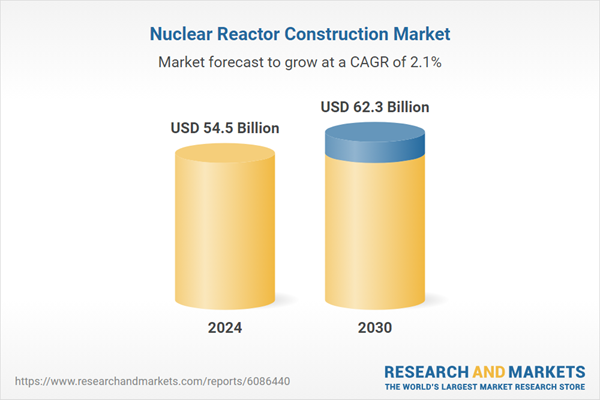Speak directly to the analyst to clarify any post sales queries you may have.
10% Free customizationThis report comes with 10% free customization, enabling you to add data that meets your specific business needs.
Innovations such as Small Modular Reactors (SMRs) and Generation IV technologies are improving cost efficiency, safety, and scalability, reinforcing nuclear’s viability in the global energy transition. Supportive government policies, including funding and incentives, are accelerating development. Additionally, modernization of aging infrastructure in developed economies presents growth opportunities. Digital technologies like AI and automation are enhancing safety and operational efficiency, while increased international collaboration and public awareness around environmental sustainability are positioning nuclear energy as a critical component in future energy strategies.
Key Market Drivers
Rising Demand for Clean, Reliable, and Low-Carbon Energy
The global shift toward decarbonization and energy sustainability is increasing the focus on low-emission energy sources. Nuclear energy has emerged as a dependable solution due to its ability to deliver uninterrupted baseload electricity with minimal greenhouse gas emissions. As industrial activity and population growth push up energy consumption - projected to rise 30% by 2040 per IEA estimates - nuclear power is being adopted to bridge the gap left by intermittent renewables. Its reliability makes it a strategic complement to solar and wind, ensuring consistent grid performance. Countries like Bulgaria have initiated new reactor projects using advanced technologies, reflecting growing global momentum for nuclear investment to meet net-zero targets and energy demand simultaneously.Key Market Challenges
High Capital Investment and Extended Construction Timelines
The nuclear sector faces significant hurdles related to high upfront investment and prolonged construction periods. Building a nuclear power plant typically involves billions in capital, along with complex engineering, stringent regulatory compliance, and extended approval processes. These factors can delay projects by 5 to 15 years, creating financial uncertainty. Construction setbacks due to technical complications, permitting delays, and changes in policy can further escalate costs. In emerging markets with limited financing options, these barriers can deter adoption in favor of quicker and less expensive alternatives like gas or renewables. The long lead times and cost overruns continue to challenge the sector’s growth trajectory despite its clean energy potential.Key Market Trends
Growth of Small Modular Reactors (SMRs) and Advanced Reactor Technologies
The adoption of Small Modular Reactors (SMRs) and next-generation nuclear technologies is reshaping the market landscape. SMRs are designed to address the high cost and complexity of traditional large-scale reactors by offering modular, scalable solutions with shorter construction times and improved safety. These reactors are factory-built, reducing on-site labor and time while enabling phased deployment based on demand. Their compact size and advanced safety features - such as passive cooling systems - make SMRs ideal for remote areas, developing countries, and industrial applications requiring reliable local power. As global interest in decentralized, low-carbon energy grows, SMRs are gaining momentum as the next phase in nuclear technology, helping to make nuclear power more adaptable and cost-efficient.Key Players Profiled in this Nuclear Reactor Construction Market Report
- GE-Hitachi Nuclear Energy, Inc.
- Westinghouse Electric Company LLC (Toshiba)
- KEPCO Engineering & Construction
- SKODA JS a.s.
- China National Nuclear Corporation
- Bilfinger SE
- Larsen & Toubro Limited
- Doosan Corporation
Report Scope:
In this report, the Global Nuclear Reactor Construction Market has been segmented into the following categories, in addition to the industry trends which have also been detailed below:Nuclear Reactor Construction Market, by Reactor Type:
- Pressurized Water Reactors
- Boiling Water Reactors
- Advanced Reactors
Nuclear Reactor Construction Market, by Application:
- Baseload Electricity Generation
- Desalination & Process Heat
- Marine Propulsion
- Others
Nuclear Reactor Construction Market, by Region:
- North America
- United States
- Canada
- Mexico
- Europe
- Germany
- France
- United Kingdom
- Italy
- Spain
- Asia-Pacific
- China
- India
- Japan
- South Korea
- Australia
- South America
- Brazil
- Colombia
- Argentina
- Middle East & Africa
- Saudi Arabia
- UAE
- South Africa
Competitive Landscape
Company Profiles: Detailed analysis of the major companies present in the Global Nuclear Reactor Construction Market.Available Customizations:
With the given market data, the publisher offers customizations according to a company's specific needs. The following customization options are available for the report.Company Information
- Detailed analysis and profiling of additional market players (up to five).
This product will be delivered within 1-3 business days.
Table of Contents
Companies Mentioned
The leading companies profiled in this Nuclear Reactor Construction market report include:- GE-Hitachi Nuclear Energy, Inc.
- Westinghouse Electric Company LLC (Toshiba)
- KEPCO Engineering & Construction
- SKODA JS a.s.
- China National Nuclear Corporation
- Bilfinger SE
- Larsen & Toubro Limited
- Doosan Corporation
Table Information
| Report Attribute | Details |
|---|---|
| No. of Pages | 188 |
| Published | May 2025 |
| Forecast Period | 2024 - 2030 |
| Estimated Market Value ( USD | $ 54.5 Billion |
| Forecasted Market Value ( USD | $ 62.3 Billion |
| Compound Annual Growth Rate | 2.1% |
| Regions Covered | Global |
| No. of Companies Mentioned | 9 |









